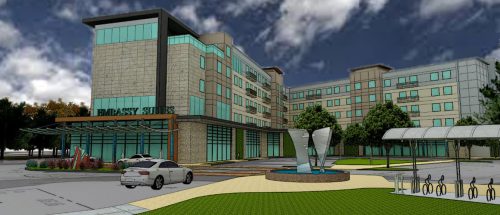
Last fall, the Vanguard made a simple request of the city, seeking to ascertain the direct cost on the city of litigation. At that time, the number from four lawsuits involving various projects in the city – including attorney fees, billable hours and settlements – was over half a million. But that only accounted for the direct costs to the city.
What that half-million dollar figure does not account for is all the other costs: the direct costs to applicants for litigation fees, the increased costs of doing business in Davis which will mean all projects will be more expensive, the opportunity costs of litigating, and the costs of delays to projects – which means delays in construction and therefore the loss of potential revenue.
It has been a month since the rather modest settlement of a lawsuit between Royal Ganesh, the company that has proposed the construction of the Embassy Suites Hotel and Conference Center on Richards Boulevard, and Michael Harrington.
The settlement itself was for $75,000 and a reduction of the number of stories, with modest changes to parking requirements. However, the big impact is that the new configuration, now submitted to the city last week, basically eliminates the conference center portion of the project.
The five-story facility (reduction from six) will still have 132 rooms, but it now includes 5,662 sf of restaurant/lounge and 4,443 sf of functional space (comprised of 3,150 sf of meeting rooms and 1,293 sf of pre-function area).
That represents a massive change, as the meeting space goes from a full conference center at 18,400 square feet of conference space to a meeting room of just 3000 square feet of space.
While the applicant still estimates the annual TOT (transient occupancy tax) at approximately $450,000 plus property taxes and sales taxes generated by hotel users eating and shopping in Davis, gone is something more. The conference center was looked at as a catalyst for demand generation.
While we may dispute some of the findings of the PKF Consulting study as overly optimistic in terms of demand generation and the need for additional hotels, their analysis demonstrates the extent of the loss to the community.
The PKF study found that a large conference center would be a huge demand generator.
They reason is that building the Embassy Suites with additional rooms and also 18,000 square feet of meeting space “would likely require additional guestrooms than what would be offered at the Embassy Suites, thus requiring additional, conveniently located hotels to accommodate this overflow demand.”
They found that 18,000 square feet of meeting space could include between 500 and 1000 attendees, depending on the type of function.
“A hotel with approximately 18,000 square feet of meeting space would typically feature between 350 and 400 guestrooms,” they noted. But the Embassy Suites will have just 132 rooms, which means that Davis will need other hotels to complement the Embassy Suites in order “to capture either overflow group demand that is booked at the Embassy Suites (but can’t be accommodated).”
PKF argued that at least three new sites could be “readily absorbed by the market,” and they found “occupancy is projected to increase to 67.0 percent in 2019 and further increase to approximately 70.0 percent in 2020 and 2021. It is at this level we project the Davis hotel market to stabilize. While this stabilized occupancy level is above the annual average occupancy level achieved by the Davis hotel market since 2007, it is in line with the year-to-date performance and is reflective of the growth occurring in Davis.”
Based on these projections, it was further projected that four new hotels could ultimately generate between $1.5 and $2 million in new revenue for the city just by themselves.
The lack of available space is a big problem for Davis. The Vanguard, for example, is hosting a big talk from civil rights Attorney John Burris. But instead of bringing John Burris to talk in Davis, we are going to the Sacramento Convention Center, as Davis lacks the facilities to host a large talk of this sort.
Litigation for all projects is becoming a way of life. Today, the Vanguard has reported that a letter from attorney Don Mooney led to a postponement of the consideration of the certification of the EIR for Mace Ranch Innovation Center (MRIC). That is a project that might generate millions in annual revenue for the city, but between concerns about the Measure R process, difficulties of financing a project in Davis, and now litigation threats, that project is on the back burner.
The city of Davis is counting on some of these hotel projects to generate anywhere from half a million to $2 million annually. More recently, the Vanguard has learned that even the Marriott Residence Inn, as uncontroversial a project as it was, now faces potential legal hurdles on the burrowing owl issue.
The more controversial Hyatt House project will be considered once again, perhaps at the end of this month, and it also faces a potential legal challenge.
The city of Davis is a great place to live, but, as the Vanguard has pointed out, its quality of life is threatened by huge and growing unfunded liabilities and unmet infrastructure needs.
We take pride in our small footprint, our commitment to protection of agricultural land, and the walkability and bikeability of this small community. However, without means to raise revenue, Davis is either going to turn into a declining asset or become a place that only the very wealthy can enjoy.
We support protections like statewide CEQA laws, we support environmental policies and the push for LEED certification and carbon neutrality.
However, we are increasingly concerned that all projects are now subject to litigation, to delays and increased costs, and believe that these actions – intended perhaps to save our community and our environment – might have the opposite impact and end up making Davis ungovernable, thus forcing the city into decreased services, declining infrastructure and increased taxes and costs of living.
We have mechanisms to protect the public interest – elections, Measure R, and an elected city council – but those mechanisms and that democracy is being usurped by the actions of a few well-placed individuals who can effectively act as gatekeepers for what can and cannot be approved.
That is not democracy and will ultimately undue the great things we have accomplished in this community.
—David M. Greenwald reporting






Might be obvious to others but why is the conference center so drastically cut in size because of the litigation? I read reconfiguration because of traffic concerns led to reassignment of parking but couldn’t rooms be decreased instead to save find center sq ft?
Hi Dianne
I also wonder about that. Especially since it was already anticipated that the hotel would not be offering sufficient rooms itself but would rather have to rely on other projects for bed capacity.
And a corollary question. If there is enough demand for a conference center, why not consider an independent conference center such as is in Sacramento, and leave the hotel spaces to other projects ?
“it is in line with the year-to-date performance and is reflective of the growth occurring in Davis.””
Which would imply to me that there is a substantial amount of growth occurring in Davis now. This would seemingly be in conflict with the mantra that Davis is hostile to business and growth, when what is really meant is that the growth is not as rapid as some would like.
“its quality of life is threatened by huge and growing unfunded liabilities and unmet infrastructure needs.”
So we have a real dilemma. Some see quality of life threatened by unfunded liabilities and unmet infrastructure needs. Some see quality of life threatened by excessive growth. Some of us see both and would like to see slow growth, not in fits and starts, but rather as a gradual well planned process with time for assessment of the impacts of each major project before jumping into multiple projects at the same time, a hallmark of a “boom and bust”mechanism that some seem to see as inevitable, but I see as almost totally avoidable through comprehensive planning rather than planning by exception.
“So we have a real dilemma”
‘Unfunded liabilities’ and ‘unmet infrastructure needs’ are quantifiable and based in reality. ‘Quality of life’ and ‘excessive growth’ are ‘value judgments’ based on an individual’s perception of reality. At times in our history, many humans ‘perceived’ that the world was flat or that the sun revolved around the earth, but most now understand that those ‘perceptions’ were incorrect and not consistent with the reality that we live in. The dilemma that we face in Davis is that many of our most strident opponents of change act as if the protection of their ‘perception’ of the world is more important than addressing the reality of the problems that we face. One might even say that to them, the world is still flat.
I think the more fundamental problem is that by attempting to keep Davis as it is, they are making it so that we cannot preserve what most of us appreciate about this community.
“Unfunded liabilities’ and ‘unmet infrastructure needs’ are quantifiable and based in reality. ‘Quality of life’ and ‘excessive growth’ are ‘value judgments’ based on an individual’s perception of reality.”
We are in partial agreement. Unfunded liabilities in terms of how much we currently or will owe for retirement and health care of employees is quantifiable since they are determined by contract. “Unmet infrastructure needs” not so much so since there can be disagreement on what level of maintenance is “needed” and for which infrastructure projects. One example being roads. David’s criteria for how much we should be putting into repair and maintenance is different for mine. I recognize that I am an outlier having grown up at the intersection of two unpaved roads, so this would be acceptable to me for some parts of town including in front of my house. I realize that this would not be a popular position, which for me proves the point that it is largely subjective.
Also, on the other side “quality of life” is sometimes not purely subjective and can be quantifiable. An example would be how we define acceptable air quality. This has changed over the years with regulations relating contaminants being variable from state to state demonstrating that there are both measurable outcomes ( quantifiable) and subjectively accepted standards.
I know that some would like to paint this as a simple “black or white” issue. I find the questions involved to be much more complicated that based in reality vs non reality based.
that’s nice… and somehow the dollars do not include the one time $10milll that the last years city council gave away to developers of the overpriced and not really needed Cannery…
if one is going to discuss wasted money.. that should be at the very top of the list.
There are many many other way more urgent ways to spend money than on additional subsidies for unneeded extra hotel rooms..
I’m not sure what you are talking about when you mention subsidies for hotels. Also I think you a misperception of the mechanism for the Cannery CFD.